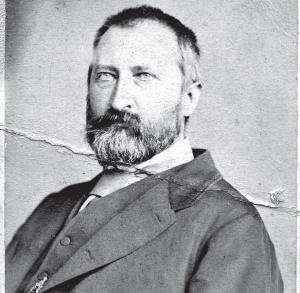Karol Klobassa (1823–1886) – co-founder of the first innovative oil enterprise

A student, conspirator, prisoner in the Austrian Partition
Karol Klobassa was born in 1823 in Drohobych, died in 1886 in Kraków. His father, Rudolf, was an Imperial-Royal official (he oversaw salt evaporation ponds in Drohobycz) and a landowner who owned several localities. The Klobassa family came to Galicia from Moravia, as did many other families of civil servants at the beginning of the Austrian rule in this area. As tradition has it, Karol’s family name is derived from the knight Kiełbasa, who was to receive his fief from King Jagiełło on the battlefield of Grunwald.
After graduating from high school, Karol went to Vienna in 1840 to study at the local polytechnic. He also studied at the University of Agriculture in Hohenheim at the faculty of agronomy. Like most of the young men in those times, he was involved in conspiracies, which in 1846 made him imprisoned in Sanok for almost a year.
Administrator, reformer, and spouse
After being released from the prison in Sanok, Karol Klobassa settled in his father’s estate in Zręcin, near Krosno. After father’s death in 1848, the organisation of work in the family estates absorbed him completely. The residents, initially distrustful, eventually became fond of the new estate owner, and even began to call him “a good lord”. His past imprisonment, which displayed his patriotism, played to his advantage. What is more, not only did Klobassa sign the memorial of Krosno district landowners that postulated the abolition of serfdom as one of the few, but also voluntarily abolished serfdom in Zręcin. This decision earned him the trust of his new employees, but his income began to shrink. At the same time, however, he entered into a good marriage. Klobassa’s beloved was Baroness Ludwika Zygmuntowska, who brought considerable estate in her dowry. The Klobasss family had twins, but the wife died soon after. Later, Klobassa stood for the second time in front of the altar at the side of the nineteen-year-old countess Helena Olimpia Bobrowska.
A breakthrough decision – from cider to … kerosene
Thanks to the two marriages, the Klobassa’s estate had grown considerably. Vast orchards provided apples from which he produced an alcoholic beverage – cider. However, the breakthrough, as it later turned out, business decision taken by Klobassa was the consent given to Tytus Trzecieski and Ignacy Łukasiewicz for an initially free-of-charge drill on his plot in Bóbrka. Trzecieski and Łukasiewicz were looking for oil, which they wanted to use, after refining, in industry (among others, for lighting). In this way, in 1854, a pioneer oil mine was established. The cooperation did not bring any results for a long time (Klobassa – seeing the failure of his colleagues – even waived the agreed payment), until finally, around 1860, a rich deposit of black gold was discovered at a depth of 22 meters. The company finally started to make profits and can be called the world’s first oil company. The three-person company operated until 1871. At that time, Klobassa became the sole owner of the Bóbrka mine, and the managing director post was taken over by his current partner – Ignacy Łukasiewicz.
Klobassa constantly modernised the mine – according to some specialists, no Galician mine before the First World War could pride itself on having such a technological level. He quickly understood that oil extraction could become the foundation of his family estate. In order not to miss this opportunity, he sent his son to the United States to study this difficult and still much in its infancy craft.
Investments in the business environment
Karol Klobassa also took care of the development of infrastructure in the area. In Krosno, many roads and bridges were created on his initiative. He founded schools in Zręcin, Bóbrka and Skołyszyn. In this first of those villages he erected a church and a cemetery chapel (together with Trzecieski and Łukasiewicz). He was also a co-founder of the National Petroleum Society. After his death, his business was taken over by his two sons – Wiktor and Stanisław.
Inspirations:
- Brzozowski Stanisław, Karol Klobassa Zręcki, [i:] Internetowy polski słownik biograficzny, developed by Polska Akademia Nauk i Polska Akademia Umiejętności, published by: Narodowy Instytut Audiowizualny [access: 15.09.2015].
Source of photos: Fundacja Muzeum Przemysłu Naftowego i Gazowniczego im. Ignacego Łukasiewicza in Bóbrka

